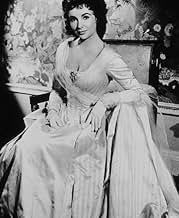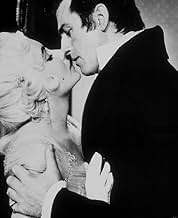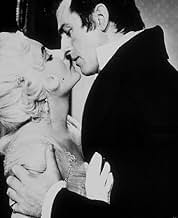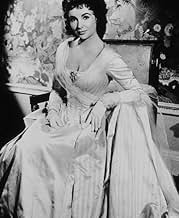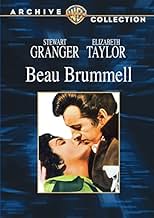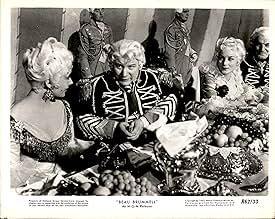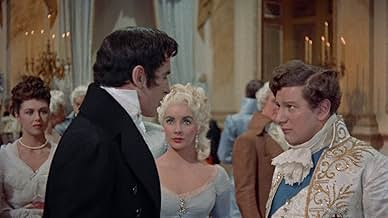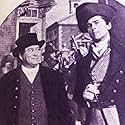In 1796, Captain George Bryan "Beau" Brummell of the 10th Royal Hussars Regiment offends the Prince of Wales with his straightforward outspokenness and gets fired from the Army but is chosen... Read allIn 1796, Captain George Bryan "Beau" Brummell of the 10th Royal Hussars Regiment offends the Prince of Wales with his straightforward outspokenness and gets fired from the Army but is chosen as the Prince's personal advisor.In 1796, Captain George Bryan "Beau" Brummell of the 10th Royal Hussars Regiment offends the Prince of Wales with his straightforward outspokenness and gets fired from the Army but is chosen as the Prince's personal advisor.
- Director
- Writers
- Stars
- Director
- Writers
- All cast & crew
- Production, box office & more at IMDbPro
Featured reviews
Lavish production casts Stewart Granger in the character of the rags-to-riches dandy and chief adviser to the Prince of Wales well played by Peter Ustinov in his usual style . The latter reveals the Prince as a man not be laughed at , but sympathised with . Granger scores a great hit as the handsome dandy who works his way into the good graces of the Prince , son of the insane king George III and future George IV . Packing magnificent period piece cinematography by cameraman Oswald Morris , spectacular sets , great musical score by Richard Addinsell and glamurous costumes . The Regency atmosphere is wonderfully well caught in this agreeable portrait of the leader of fashion in his day , spendthrift and scoundrel . Shot on location in England's gorgeous countryside , many of the interior shots are from a 15th-century mansion , Ockwell mansion , located near Windsor Castle . It is a remake of the 1924 silent film by Harry Beaumont with John Barrymore . As George Bryon 'Beau' Brummel , Mary Astor Mary Astor , Willard Louis and Irene Rich.
The motion picture was professionally directed by Curtis Bernhardt . He was a Hollywood craftsman who worked in various Majors as Warner Bros and MGM, largely on the strength of Carrefour (1938) which proved so enduring that it was remade as Dead Man's Shoes (1940) in the UK and as Crossroads (1942). Bernhardt rapidly achieved a reputation as a woman's director with occasional forays into suspense with varied results and providing stunning casting in his impressive films . He directed one of Humphrey Bogart's least popular films, Conflict (1945). Soon after , he moved to RKO, which was entering its final chaotic decade, directing The Blue Veil (1951), a remake of a French film. He did a one-shot gig at Columbia, directing Bogie once again in the hopelessly set-bound Sirocco (1951) and this Beau Brummell (1954) that was one of the brilliant and convincing slices of history that MGM ever financed . Rating : 7/10 , better than average . This is a must-see for admirers of the Technicolor movies nearing its peak of perfection .
The film is far from being historically accurate, especially as regards chronology. The events depicted here (the Regency Crisis of 1788, the Prince's marriage to Caroline of Brunswick, Brummell's rise in the Prince's favour, his fall from grace, the death of King George III in 1820 and Brummel's own death in 1840) historically cover a period in excess of fifty years, but here they are presented as occurring over a much shorter timescale. Rather oddly, the villain of the piece is William Pitt the Younger, widely regarded as one of Britain's greatest Prime Ministers but presented here as a cunning, power-hungry schemer who refuses to allow King George III to be certified as mad (although he quite obviously is) in order to protect his own power. (The relationship between Pitt and the King depicted here more closely resembles that between the Austrian Chancellor Prince Metternich and the feeble-minded Emperor Ferdinand I who, for political reasons, was never declared to be insane). In reality Pitt died in 1806, but here he is shown as outliving not only George III but also Brummell.
The film's politics are, in fact, rather inconsistent. Early on, Brummell, whose family although wealthy are of fairly humble stock, is portrayed as something of a radical filled with the spirit of the French Revolution and complaining about the class divisions within British society. Later on, however, he becomes as the Prince's friend an arch-reactionary, encouraging the future George IV to defy Parliament and to rule more as an autocrat than as a constitutional monarch. Brummell's justification for this apparent change of heart is that he feels that the Prince will make an admirably liberal ruler, far more liberal than Pitt, but the character played by Peter Ustinov does not really make us feel that this confidence is well-founded.
Stewart Granger was known for playing dashing heroes in costume dramas, so was well-suited to the lead role, although it contains less in the way of physical action than some of his other parts from this period. Ustinov gives a good comic performance as the petulant, self-pitying Prince, and Robert Morley a more serious one as the mad old King. I was, however, surprised to see Elizabeth Taylor, already a major star in her early twenties, in a comparatively minor role. She plays Brummell's love-interest Lady Patricia Belham, although he eventually loses her to another man. Apparently Lady Patricia, a fictitious character not found in the play on which the screenplay was based, was inserted to allay any suspicions on the part of the ultra-puritanical American censors that the friendship between Brummell and the Prince might be homosexual in nature.
"Beau Brummell" is not the sort of film which is likely to please the historian, but then it was never intended to. It was clearly intended as an enjoyable period romp and, to some extent, still works on that level. 6/10
Did you know
- TriviaThis movie had troubles with the U.S. censor, the Production Code Administration, because of the apparent justification of the immoral relationship between the Prince of Wales, played by Sir Peter Ustinov, and Mrs. Fitzherbert, played by Rosemary Harris, because a steward at a gentlemen's club had the manner of a "sex pervert", because the Prince checks the gender of a dog, and because of the use of the word "damn". Changes were made, but the running time remained the same.
- GoofsThe final meeting between a dying Brummell and George IV is fiction, as the King declined the meeting and Brummell was not on his deathbed at the time. He outlived George IV by ten years.
- Quotes
Beau Brummell: [to Patricia] Please stay. We want each other. Think of the story you can tell our grandchildren.
- ConnectionsFeatured in Elizabeth Taylor - An Intimate Portrait (1975)
- SoundtracksMilanollo
(uncredited)
Music by Johann Valentin Hamm
- How long is Beau Brummell?Powered by Alexa
Details
Box office
- Budget
- $1,762,000 (estimated)
- Runtime1 hour 53 minutes
- Color
Contribute to this page



